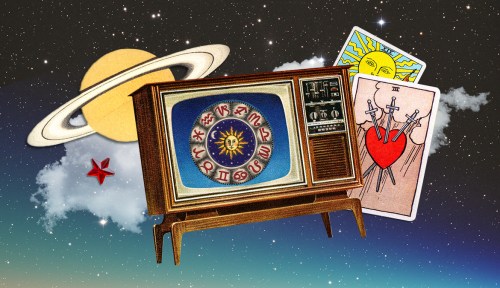Our editors independently select these products. Making a purchase through our links may earn Well+Good a commission
It took me 27 years to be in what I would consider a long-term relationship. Although I met my boyfriend—who is, by the way, 31 and also had not previously been in a “serious” relationship—when I was 25, we weren’t really, truly committed until recently.
My lack of success on the stable-relationship front wasn’t for lack of effort. I dated pretty prolifically throughout my twenties—I even wrote a whole book about the ins and outs of modern dating, which turned into a tome about the all-too-common phobia of commitment in the contemporary landscape. I dated many mehs, some maybes, and a few suitors with real potential, but between career shifts, moves, general immaturity, and a lack of mutual sustained interest, none of the flings blossomed into a long-term situation. And for years, I wondered how much of it was my fault.
Was something wrong with me? Was I not choosing correctly? Or was everyone else and their commitment issues the problem? The only thing I knew for sure was that I was confused. I constantly heard from friends and loved ones that I’m smart, attractive, and fun to be around, and that I should have zero problems securing a lasting relationship. But of course, those well-intentioned affirmations meant to gas me up only made me feel worse about my lack of success in the love sphere.
What made me feel better was learning I wasn’t alone: While writing my book, I spoke with many men and women in their twenties and thirties who also had never been in a long-term relationship. Finding this community surprised me, relieved me, and made me realize how important it is to normalize the experience of seeming to fail at the dating process—a phenomenon one psychologist says is a product of our culture. “I keep coming back to the concept of ‘life task,’ he says. “At any given time, there is something you’re trying to accomplish,” says psychologist Art Markman, PhD, author of the forthcoming Bring Your Brain to Work. “We added a life task. Traditionally, it’s been going from adolescence, to college, onto career and family. Now, we’ve separated career and family. More recently, early in adulthood, there is less emphasis on romantic relationships and more emphasis on career.”
“Traditionally, it’s been going from adolescence, to college, onto career and family. Now, we’ve separated career and family. More recently, early in adulthood, there is less emphasis on romantic relationships and more emphasis on career.” —psychologist Art Markman, PhD
But not everyone got the memo, says Dr. Markman; some still act like twentysomething life is about finding that person with whom to settle down, while others are primarily focused on advancing their career—but doing both simultaneously isn’t necessarily the common experience anymore. Blame the growing gig economy (leading many workers to have little choice but to focus on furthering their career and hustle) or the new “emerging adulthood” stage of development (a post-grad period reserved for an adolescence 2.0 of sorts), but it seems the delay for coupling off is often rooted in some practical reasoning. If, for instance, you don’t feel solid professionally, you likely don’t feel like you’re in the best headspace in general. And not being your best self does not lend itself well to a meaningful romantic union.
“When there’s uncertainty surrounding career—if it’s hard to land a full-time job or if there’s a lot of movement—people can’t guarantee they’ll be able to stick around,” Dr. Markman says. And with dual-earning couples who aren’t fully committed to prioritizing a future together, there’s even less flexibility: If one person moves to pursue a professional opportunity and the other can’t move due to their own situation, a split is basically imminent.
Furthermore, there’s the modern-dating issue of having too many options. Subconsciously or not, a lot of people fall victim to the paradox of choice, avoiding commitment while in search of the perfect partner. “Millennials were also taught that everything is disposable,” says clinical counselor Karla Ivankovich, PhD. “As such, they have dated a lot of people, believing that the next best thing is right around the corner. When they don’t find it, they keep looking—and never fully commit to making a relationship work.”
It can be a toxic cycle, but some people do snap out of it, wanting to give promising relationships a real chance to work. And here’s the thing: As long as you’re introspecting about each failed non-relationship and acknowledging what you could have done differently, better, and what was completely out of your control, the only thing to blame may be the fast-paced, casual-dating culture in which we live.
To this, Dr. Markman says to stay positive—regardless of your Facebook News Feed that’s basically an endless scroll of engagement and birth announcements. “You have to stop engaging in social comparison,” he says. Also, don’t stop living your life. “When your goal is to find a person, a lot of your other goals and hobbies fall to the wayside,” he says. “It’s better to put yourself in situations with people who are like-minded. Then, the romantic relationship develops as a side effect of what you already love in your life.”
You might even be surprised by what you stumble over while you’re just living your life. I met my boyfriend when we kept crossing paths because we shared good friends. I got to see who he was when he wasn’t trying to impress me romantically, and in the process, I fell for him, serendipitously discovering what I’d spent many years actively looking for. Of course, we all have different journeys to end up in a situation that works (whether we knew what that looked like all along or not), but when I think about how my story took course, all I can do is laugh.
Single and loving it? Here’s what happened when one writer took an intentional dating sabbatical. Also, here’s how to deal when you’re into your single status, but your parents aren’t.
Sign Up for Our Daily Newsletter
Get all the latest in wellness, trends, food, fitness, beauty, and more delivered right to your inbox.
Got it, you've been added to our email list.











